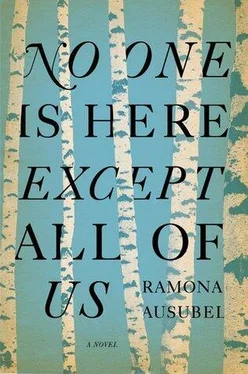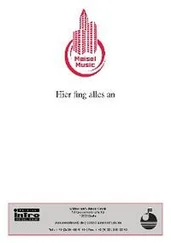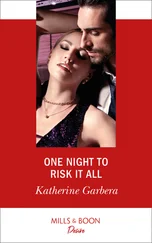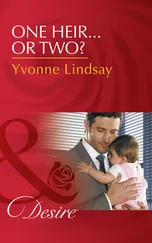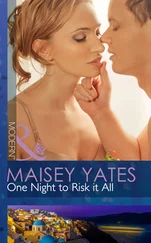There had been so many chances for her to die that day, but she alone was to see what the future held. Still, alive was not what she felt. Scooped out, maybe. Like a woman whose innards have been removed, unwound and lain down as a bed for her. When the jeweler, not knowing she was awake, tiptoed outside sleepily in the baby-pink dawn light of the third day of the world, she thought of tucking his form into the empty space of her body, giving him a warm nest there, letting what she was missing become a place for another person to rest. I pray for , she said, but could not name what was missing to a God she had not met. I pray , she said, and it was true.
When the jeweler returned and lifted the envelope of blankets on his bed to climb inside, she said, “Thank you for being nearby.” The jeweler, shocked to hear her voice, came over and, crouching at her side, cupped his hand over her shoulder and took a turn being speechless. It hardly mattered, because she understood what he meant: emptiness could be so dense as to develop its own gravity. A planet forming out of the whirling dust of a void. Two planets, orbiting.
On the third morning of the world, my uncle Hersh, the saddlemaker, knocked on our big blue door. We children were lying on the floor by the window reading a book I had sneaked from one world to the other. Our father was out in the fields, gathering globes, and our mother put her knife down next to the ribboned green leaves.
Uncle Hersh shook his wet coat out and laid it across the back of a chair. “I have to say something right away before I lose my nerve. You have some children and we have none.”
“You want some tea?” my mother asked. “You want some cabbage?”
She set him up at the table with a steaming bowl.
“I’m sorry. I’m terribly, horribly sorry and I haven’t even said anything yet.” He closed his eyes. The next words were spit out, like bitter grapeseeds. “Kayla wants a child, now that the world is starting over.”
“She always wanted a child,” my mother said.
“But now it’s the beginning,” Hersh told her. “Right now. She believes. Everything is ahead of us — who will Kayla and I send out into the new world? Who will carry our memories on for us when we die? How will I survive another lifetime of disappointing my wife?” He spoke quickly, the sentences memorized and practiced.
Years that did not matter now, that did not even exist, had been filled with fruitless trying. Hersh was strong and smelled of leather and oil, and had money stashed in all the cracks in his walls. He had big feet and big hands and the eyebrows of a man three times his age. His teeth were a strong fence. But at night, under the covers, he was useless.
At first my aunt and uncle had meant it when they took their clothes off and lay with nothing between them. Kayla had fixed her hair in a bun pinned with part of a turtle’s shell and she managed to meet his eyes and she prayed and she liked how it felt. He loved how it felt and he was excited, very excited, to see what he would produce. He thought for sure there would be quadruplets right away, if not quintuplets or sextuplets and whatever came after that. It seemed impossible that thousands of babies would not come storming from his wife’s body. “I’m sorry, my sweet,” he practiced saying, “to put you through all that birth-giving. I cannot help it.”
After the first months with no babies, Hersh had begun to feel confused. Where could they be? Kayla displayed no promising lump. He considered returning her to her parents. “This wife is not working,” he would say.
Kayla’s baby-hunger was a heat source, cooking her from the inside. After many baby-empty years, Kayla’s mind had corroded from unfulfilled desire. My uncle got up in the mornings, kissed her, told her she was his darling, and went to work. He hammered and nailed and molded. He tanned the leather and cut the leather and sewed the leather with smaller strips of leather. There was nothing else for him to do. My aunt spent her entire day lying on the very unsoft wood floor of their large kitchen. The black stove smirked at her, the table legs and the chairs turned away. Her sewing box, bursting with pins, appeared like an open, laughing mouth. She saw no reason to stand up. She looked like a splayed-out star, her head resting on a stack of worn-out cookbooks.
She stared at the heavens, which she had to imagine beyond the low ceiling. She knew where all the spiders lived, and watched them string shimmering threads from beam to beam. She clicked her tongue. She saw babies sitting on all available surfaces. Babies on clouds, babies lolling about on the face of the sun, singed and singing. Kayla saw babies on her kitchen table, babies on the chairs, babies under the floorboards, the walls filled with them, stacked up on top of one another, standing on one another’s shoulders. Her house was a house made of them, her own body was a body made of them, her legs were three babies each, her belly was four babies.
Then the world began again. Nothing had ever happened before. No failed attempts, no hopeful week or two followed by a terrible spot of blood. That first night, when my aunt and uncle lay down on their horsehair mattress, between the sheet and the quilt Kayla’s mother had made for her girl when she was married, they cried into each other’s skin. “We have another chance now,” she said. “Maybe in the new world it will be possible.” But Hersh was sure that several days later he would hold her again while she disappeared with sorrow, her empty womb shaking like a rattle. They made love anyway and he let her believe in it. The smile she gave him was so crisp and pure, so unmuddied by sadness and disappointment that Hersh started to cry. “Yes,” Kayla said, “I can feel it, too. We’re going to have a baby.” All Hersh wished for was to have his wife back.
He said, “Walk outside with me and look at the world.” The two of them went shoeless to the doorstep. Their toes were blind and fragile on the stones. Around Hersh and Kayla, the trees were shooting buds out of all their pointed ends.
“You will always be enough for me,” Hersh told his wife, but she waved him off.
“There is more to hope for.” He rubbed his eyes and tried to make the word hope not mean despair. Hope , he said to himself, wiggling it with his tongue like a loose tooth.
In our kitchen, Uncle Hersh’s hands trembled.
“Will you be helping out in the new temple?” my mother asked.
“Kayla really believes,” Hersh told her. “I think I can save her. I think she’ll be herself again.” Hersh had found some courage, some trust in his reason for coming. His voice was full of determination.
“Have you made a saddle yet in the new world?”
“All those years felt like drowning. It felt like watching my wife sink to the bottom of the sea.”
“You want some more tea?” my mother asked, polishing the handle of the teapot with her thumb.
“I’m sorry. I wish I could do this myself. You have no idea.”
My siblings and I did not speak or move. Our eyes met for tiny seconds before we looked away again, not wanting to see our own scared faces reflected back.
Hersh paused. “I don’t want you to think about it, I just want you to say yes.”
“You want to buy one of my children?” My mother’s face was flat and still.
“We can become parents, which you will still be. She will be happy.”
“It’s a she you want?”
“I wouldn’t ask for your son. She can learn to cook everything. She can be taught to read and to write.”
My mother explained that her children were not babies and already knew those things, even little Lena knew those things. “She’s small for her age, but she’s smart for her age, too.” From across the room, hearing her say my name made me itch. Moishe, Regina and I had stopped turning the pages of the book we had been reading — an encyclopedia of dog breeds. We had been on the Australian shepherd page. The animal was frozen, staring at us with one blue eye, one brown.
Читать дальше
